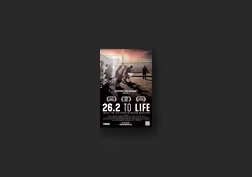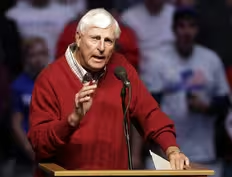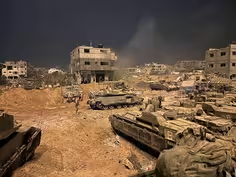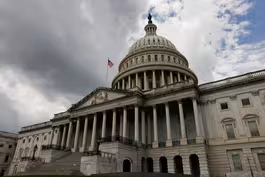
Fighting Hamas in tunnels is like 'war in a phone booth'
Clip: 11/2/2023 | 5m 7sVideo has Closed Captions
Fighting Hamas inside Gaza’s tunnels is like 'war in a phone booth'
Israel says many of its airstrikes target Hamas commanders and the group's extensive network of tunnels. That network is making the fight for Gaza City deadly for Israeli troops as 20 Israeli soldiers have died in just the last 3 days. Nick Schifrin reports on Hamas' tunnels and why they pose such a significant challenge.
Problems playing video? | Closed Captioning Feedback
Problems playing video? | Closed Captioning Feedback
Major corporate funding for the PBS News Hour is provided by BDO, BNSF, Consumer Cellular, American Cruise Lines, and Raymond James. Funding for the PBS NewsHour Weekend is provided by...

Fighting Hamas in tunnels is like 'war in a phone booth'
Clip: 11/2/2023 | 5m 7sVideo has Closed Captions
Israel says many of its airstrikes target Hamas commanders and the group's extensive network of tunnels. That network is making the fight for Gaza City deadly for Israeli troops as 20 Israeli soldiers have died in just the last 3 days. Nick Schifrin reports on Hamas' tunnels and why they pose such a significant challenge.
Problems playing video? | Closed Captioning Feedback
How to Watch PBS News Hour
PBS News Hour is available to stream on pbs.org and the free PBS App, available on iPhone, Apple TV, Android TV, Android smartphones, Amazon Fire TV, Amazon Fire Tablet, Roku, Samsung Smart TV, and Vizio.
Providing Support for PBS.org
Learn Moreabout PBS online sponsorshipGEOFF BENNETT: Israel says many of its airstrikes target Hamas commanders and Hamas' extensive network of tunnels.
That network is making the fight for Gaza City deadly for Israeli troops; 20 Israeli soldiers have died in just the last three days.
Nick Schifrin reports on Hamas' tunnels and why they pose such a major challenge.
NICK SCHIFRIN: They emerge from the darkness into the light only long enough to strike.
Hamas propaganda videos show fighters exiting tunnels to fire at nearby Israeli tanks.
These are guerrilla tactics, small Hamas teams sneaking up on Israeli soldiers with far superior technology, or using drones to drop mortars, helping make Israel's Gaza ground invasion deadly and difficult.
Buried deep underground, Hamas has built what Israel assesses is a tunnel network 200 to 300 miles' long.
Dug by hand, it's called the Metro, where Hamas fighters can move weapons and themselves safely.
The tunnels have ventilation, electricity, and are Hamas' single most important asset.
MAJ. JOHN SPENCER (RET.
), Modern War Institute: Hamas has built for decades tunnels leading under, integrated in to all the Gaza cities.
NICK SCHIFRIN: John Spencer chairs the Modern War Institute's urban warfare studies at West Point and has visited tunnels in Israel.
MAJ. JOHN SPENCER: They use them for every thing you can imagine to smuggle all the rockets and weapons technologies they currently have, to infiltrate Israel, to include on October 7, to place rockets that don't need people in hidden little openings of the tunnels.
BENJAMIN NETANYAHU, Israeli Prime Minister: Israel will stand against the forces of barbarism until victory.
NICK SCHIFRIN: Israeli leaders have indicated their goal is the destruction of Hamas militarily and politically.
That will require the destruction of Hamas' tunnels, says Spencer.
MAJ. JOHN SPENCER: They can't accomplish their political goal without fully destroying all Hamas' tunnels, so they can never be used again.
That's a military capability that can't be allowed to exist, because it's how Hamas did October 7.
It's how it was able to launch 2,000 rockets in a single day.
NICK SCHIFRIN: But that goal is incredibly challenging when tunnels are difficult to detect, let alone eliminate.
And Israel says they are located under heavily populated civilian areas, including Gaza's largest hospital, Shifa.
MAJ. JOHN SPENCER: They built many of their tunnel entrances and exits and passageway underneath protected sites like hospitals, schools, mosques, because it restricts the use of force that the IDF can take without going through the -- all the laws of war calculation.
NICK SCHIFRIN: The U.S. has faced the challenge of urban warfare in the past, fighting al-Qaida in Iraq and Fallujah in 2007 and leading a coalition that liberated Mosul from the Islamic State 10 years later.
Do you believe that those are good models?
Joe Buccino is a retired U.S. Army colonel.
COL. JOE BUCCINO (RET), U.S. Army: The better historic parallel is the Vietnam War.
NICK SCHIFRIN: In the Cu Chi district outside Saigon, the Vietcong created more than 100 miles of tunnels to survive U.S. airstrikes, resupply fighters and sneak up on American troops.
COL. JOE BUCCINO: The first implication of the Cu Chi tunnels was psychological.
The Vietcong fighters were popping up out of the ground almost like they were mystical creatures who didn't -- who could bypass the laws of physics.
NICK SCHIFRIN: And the last thing U.S. troops in Vietnam wanted to do was enter the tunnels.
COL. JOE BUCCINO: The defensive unit, the unit in the tunnels, has every advantage, awareness, speed, intelligence, ability to withdraw.
It's very hard fighting.
This is claustrophobic.
This is a war in a phone booth.
NICK SCHIFRIN: Buccino most recently served in Central Command, responsible for the Middle East.
COL. JOE BUCCINO: The IDF plan for the tunnels involves developing sufficient intelligence to target the generators and ventilation systems.
Furthermore, by cutting off fuel into Gaza, they feel they can choke out those tunnel systems, in so doing, shutting them down without having to send large forces into the tunnels.
NICK SCHIFRIN: But Palestinians point out blocking fuel and electricity blocks hospitals from saving lives.
And Israel continues to bombard civilian neighborhoods like the Jabalia refugee camp in the name of destroying tunnels and killing Hamas leaders.
Palestinians say hundreds of civilians died and will continue to die in a war that Israel warns will be long.
COL. JOE BUCCINO: The IDF would like the fighting in Gaza City to take 30 days and then turn to the south.
The fighting in the south is going to take months.
So this is going to be a very long process.
NICK SCHIFRIN: A process that will see heavy fighting above and below the Gaza Strip.
For the "PBS NewsHour," I'm Nick Schifrin.
'26.2 to Life' tells story of prison running club
Video has Closed Captions
Clip: 11/2/2023 | 7m 23s | New documentary '26.2 to Life' tells story of inmates who joined a prison running club (7m 23s)
The controversial legacy of basketball coach Bob Knight
Video has Closed Captions
Clip: 11/2/2023 | 7m 37s | The controversial legacy of Hall of Fame college basketball coach Bob Knight (7m 37s)
How Biden is handling increase in antisemitism, Islamophobia
Video has Closed Captions
Clip: 11/2/2023 | 12m 3s | How the Biden administration is handling the increase in antisemitism and Islamophobia (12m 3s)
Israeli forces close in on Gaza City amid calls for pause
Video has Closed Captions
Clip: 11/2/2023 | 3m 47s | Israeli forces close in on Gaza City as calls for humanitarian pause go unheeded (3m 47s)
News Wrap: Storm slams western Europe, killing 7
Video has Closed Captions
Clip: 11/2/2023 | 4m 28s | News Wrap: Storm slams western Europe, killing at least 7 people (4m 28s)
Tensions in Congress over Israel aid, military promotions
Video has Closed Captions
Clip: 11/2/2023 | 5m 42s | Tensions flare in Congress over Israel aid and Tuberville's block on military promotions (5m 42s)
'Wild Kingdom' returns to inspire new wildlife enthusiasts
Video has Closed Captions
Clip: 11/2/2023 | 5m 50s | 'Wild Kingdom' returns to TV to inspire the next generation of wildlife enthusiasts (5m 50s)
Providing Support for PBS.org
Learn Moreabout PBS online sponsorship
- News and Public Affairs

FRONTLINE is investigative journalism that questions, explains and changes our world.

- News and Public Affairs

Amanpour and Company features conversations with leaders and decision makers.












Support for PBS provided by:
Major corporate funding for the PBS News Hour is provided by BDO, BNSF, Consumer Cellular, American Cruise Lines, and Raymond James. Funding for the PBS NewsHour Weekend is provided by...






